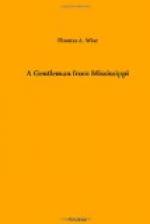When Norton and Haines had left them, Langdon turned sadly to the two children who had disgraced him.
“Can you understand?” he said. “Do you know what you’ve done to me?”
“What, father? We’ve done nothing wrong!” protested Carolina.
“They told me it was perfectly legitimate,” urged Randolph. “They said everybody—Peabody and Stevens and the rest—were in it, and Peabody is the boss of the Senate.”
“Yes, my boy,” assented the old planter, “he’s the leader in the Senate, and that’s the shameful part of all this—that a man of his high standing should set you so miserable an example.”
Randolph Langdon was not a vicious lad, not a youth who preferred or chose wrongdoing for the increased rewards it offered. He was at heart a chivalrous, straightforward, trustful Southern boy who believed in the splendid traditions of his family and loved his father as a son should a parent having the qualities of the old hero of Crawfordsville. Jealous of his honor, he had been a victim of Norton’s wiles because of the Congressman’s position and persuasiveness, because this companion of his young days had won his confidence and had not hesitated to distort the lad’s idea of what was right and what was wrong.
Randolph began an indignant protest against his father’s reproof when the Senator cut him short.
“Don’t you see?” said the Senator. “I can understand there being rascals in the outside world and that they should believe your careless, foolish old father lawful game, but that he should be thought a tool for dishonest thieving by members of his own family is incomprehensible.
“Randolph, my son, Carolina, my daughter, through all their generations the Langdons have been honorable. Your mother was a Randolph, and this from you! Oh, Carolina! And you, Randolph! How could you? How could you betray or seek to betray your father, who sees in you the image of your dear mother, who has gone?”
CHAPTER XX
THE CALL TO ARMS
Both Randolph, and Carolina were deeply affected by their father’s words.
The daughter attempted to take on herself the blame for her brother’s action.
“I was the older one. I might have stopped him if I had wished, and should bear the burden.”
“No, no, father,” exclaimed the youth, his inborn self-reliance prompting him to shoulder the consequences of his own mistakes. “I, and I alone, am responsible for what I did. I did not realize that it was wrong. I will not hide behind Carolina.”
Carolina Langdon bore herself better than was to have been expected under the strain of the painful interview. She saw more clearly now how she had erred. She was undergoing an inward revolution that would make it impossible for her ever again to veer so far from the line of duty to her father, her family and to herself.




